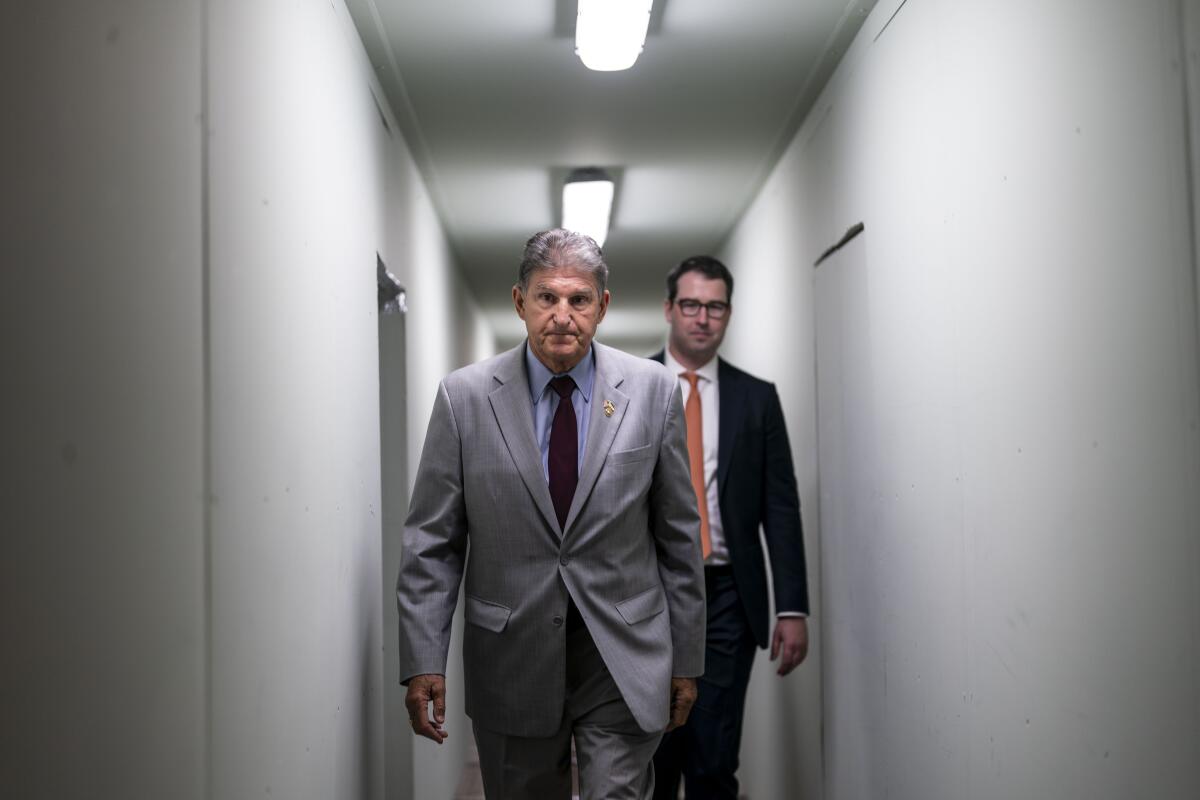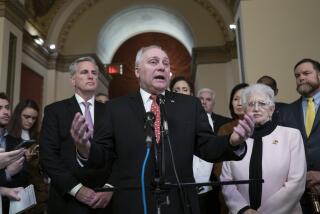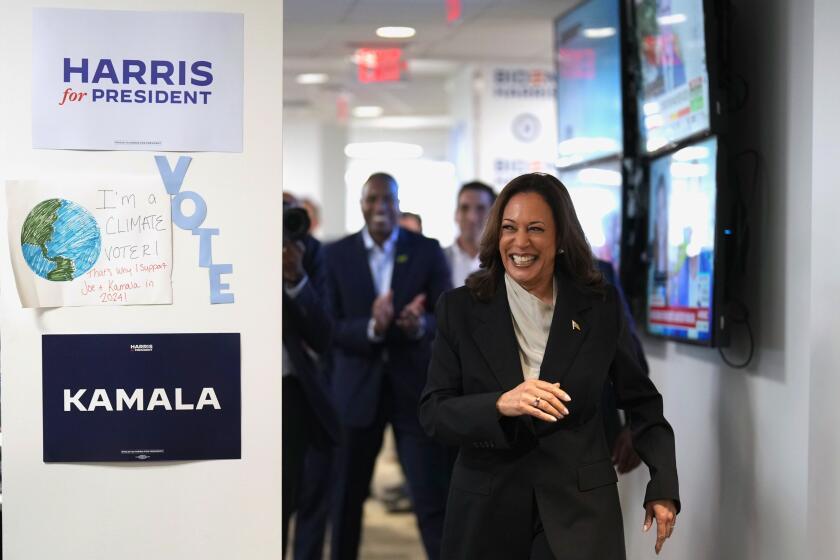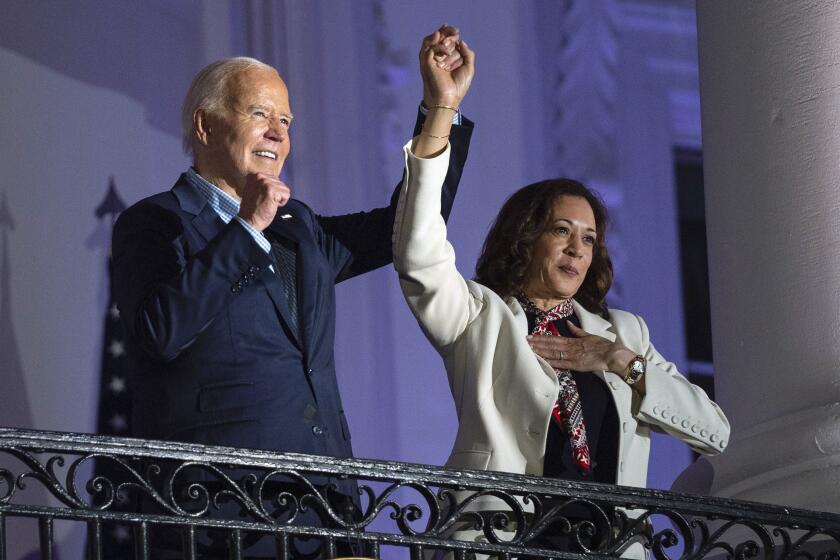With climate and tax reform out, Democrats aim for slim healthcare bill

After Democratic Sen. Joe Manchin III this week rejected his party’s promised reforms on taxes and climate change, President Biden on Friday urged Democrats to instead pass a slimmed-down healthcare bill in the run-up to the midterm election.
Manchin (D-W.Va.), the most conservative Democratic senator and the key vote on many issues in a 50-50 Senate, said this week he would not consider tax or climate reforms until July inflation figures are announced in August.
His position forces Democrats to choose between passing a bill that would contain only healthcare policy or rejecting Manchin’s hold on the party’s agenda and passing nothing.
Senate Majority Leader Charles E. Schumer (D-N.Y.) and other Democrats, including Biden, want a bill passed before Congress leaves for its August recess and when major legislation typically dies down in an election year.
It would likely serve as their last major policy message before voters go to the polls to determine which party controls Congress for the remainder of Biden’s current term.
“Chuck, can we just wait until the inflation figures come out … and then make a decision what we can do and how much we can do” on climate and taxes? Manchin told Schumer on Thursday, according to the West Virginian’s retelling on a local radio station Friday. “He took that as no, I guess.”
Manchin said on MetroNews Talkline the only policies he would support this month are allowing Medicare to negotiate drug prices and extending enhanced subsidies under the Affordable Care Act.
Drug price negotiation would be a substantial policy win as Democrats have been working on it for nearly 20 years and the healthcare subsidies have become a short-term political imperative for the party, given the spike in premiums that would result if it is not enacted.
The subsidies would likely need to be done before the August recess to have a political impact ahead of the midterms.
Manchin said the drug negotiation policy would save the federal government about $280 billion. He called for $40 billion of that savings to go toward extending the subsidy enhancements and the remainder to go toward deficit reduction.
Biden endorsed the health policy plan, saying, “The Senate should move forward, pass it before the August recess, and get it to my desk so I can sign it.”
In a nod to Manchin’s impact, Biden acknowledged that Schumer offered “significant compromises to try to reach an agreement.”
While Democrats have long expressed frustration with the seemingly single-handed control Manchin has over Biden’s agenda, progressive Democrats did not immediately balk at backing the portions of a bill Manchin could support. Rep. Jared Huffman (D-San Rafael) viewed it as a better option than holding out hope Manchin would support a climate plan.
“If I thought continuing to coddle Mr. Manchin would get us a climate deal, I would be over there with a dozen roses and giving him a foot rub,” he said. “Lucy has pulled back the football a few too many times.”
Rep. Pramila Jayapal (D-Wash.), chair of the Congressional Progressive Caucus, criticized Manchin for “consistently” working to undermine Biden’s agenda, but said she didn’t reject the health policies.
Several Senate Democrats tweeted out concern for the climate crisis, but few went after Manchin by name. One exception was Sen. Martin Heinrich (D-N.M.), who questioned why Manchin is the chairman of the Senate Committee on Energy and Natural Resources.
“We have an opportunity to address the climate crisis right now,” Heinrich said. “Sen. Manchin’s refusal to act is infuriating. It makes me question why he’s chair of ENR.”
The exclusion of climate policies could eliminate any meaningful action on the issue for years, given the strong opportunity Republicans have to take control of the House in the midterms. Huffman worries that the lack of Democratic accomplishments on climate when the party controls both chambers of Congress — albeit by slim margins — and the White House could have a further chilling effect for the party in the election.
“The challenge there is that we’ve got all of these young people and this base out there that has been demanding climate action and they’re going to be hugely disappointed, and they’re going to be tempted to blame Democrats for this,” he said. “So that’s a problem for us. We need to explain that we only had 49 Democrats for climate action. ... We just need at least one more of them in the U.S. Senate.”
Almost immediately after word of Manchin’s position circulated in Washington, Democrats turned their attention to the White House and what Biden might be able to accomplish on climate through executive action.
Sen. Sheldon Whitehouse (D-R.I.) released a list of 10 actions the administration could take, including requiring carbon capture from major pollution emitters, imposing stricter limits on coal- and gas-fired power plants, and setting stronger emission controls on vehicles.
Biden committed Friday to taking executive action on climate, although he was not specific about what his administration would do.
“If the Senate will not move to tackle the climate crisis and strengthen our domestic clean energy industry, I will take strong executive action to meet this moment,” he said in a statement, adding that the actions “will create jobs, improve our energy security, bolster domestic manufacturing and supply chains, protect us from oil and gas price hikes in the future, and address climate change.”
The renewed focus on the bill came about in the last several weeks as Manchin and Schumer renewed negotiation on a package. The slimmed-down bill was resurrected from last December, when Manchin said he wouldn’t go along with a much more expansive version that covered policies such as climate, child care, education and healthcare.
The bill Democrats are discussing would be enacted under a fast-track Senate procedure that allows the majority party to avoid a filibuster. They used the same procedure, called reconciliation, to enact a COVID-19 support bill last year.
Times staff writer Courtney Subramanian contributed to this report.
More to Read
Get the L.A. Times Politics newsletter
Deeply reported insights into legislation, politics and policy from Sacramento, Washington and beyond. In your inbox three times per week.
You may occasionally receive promotional content from the Los Angeles Times.







